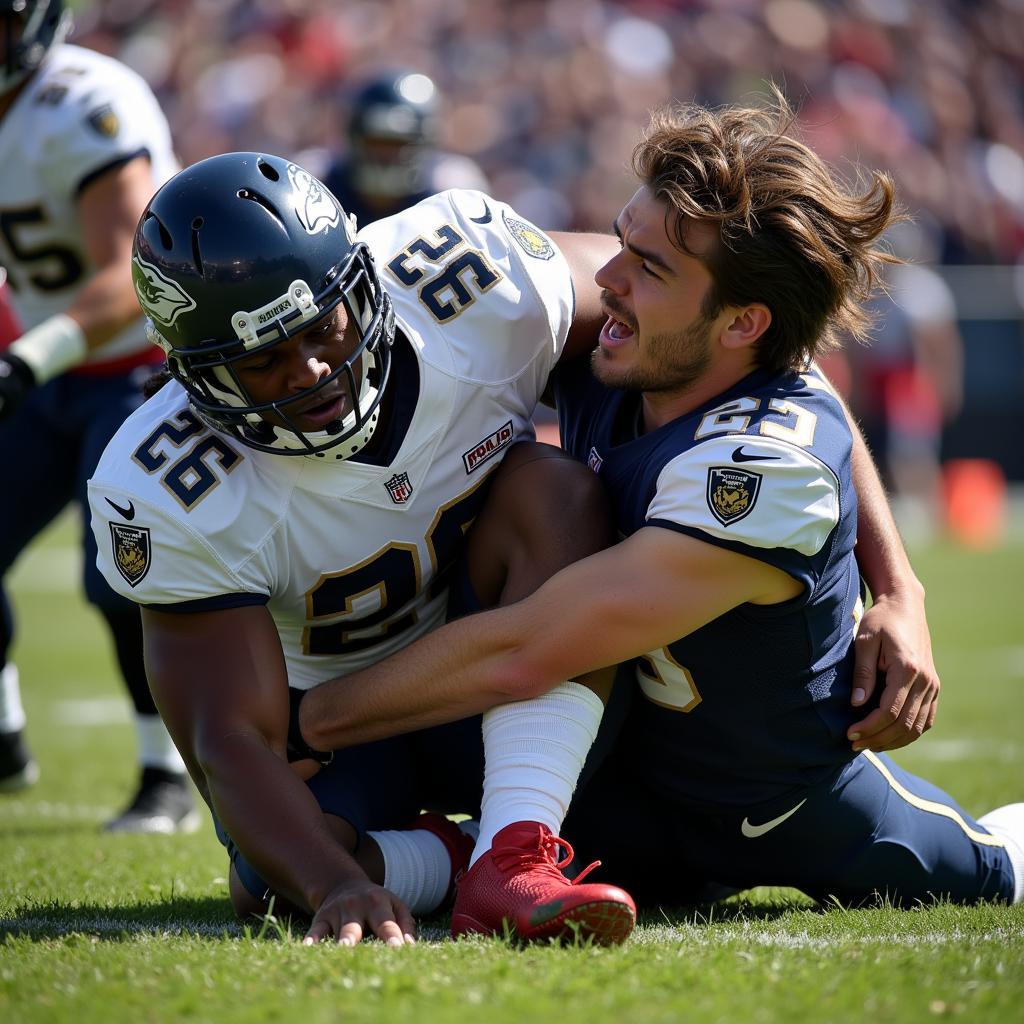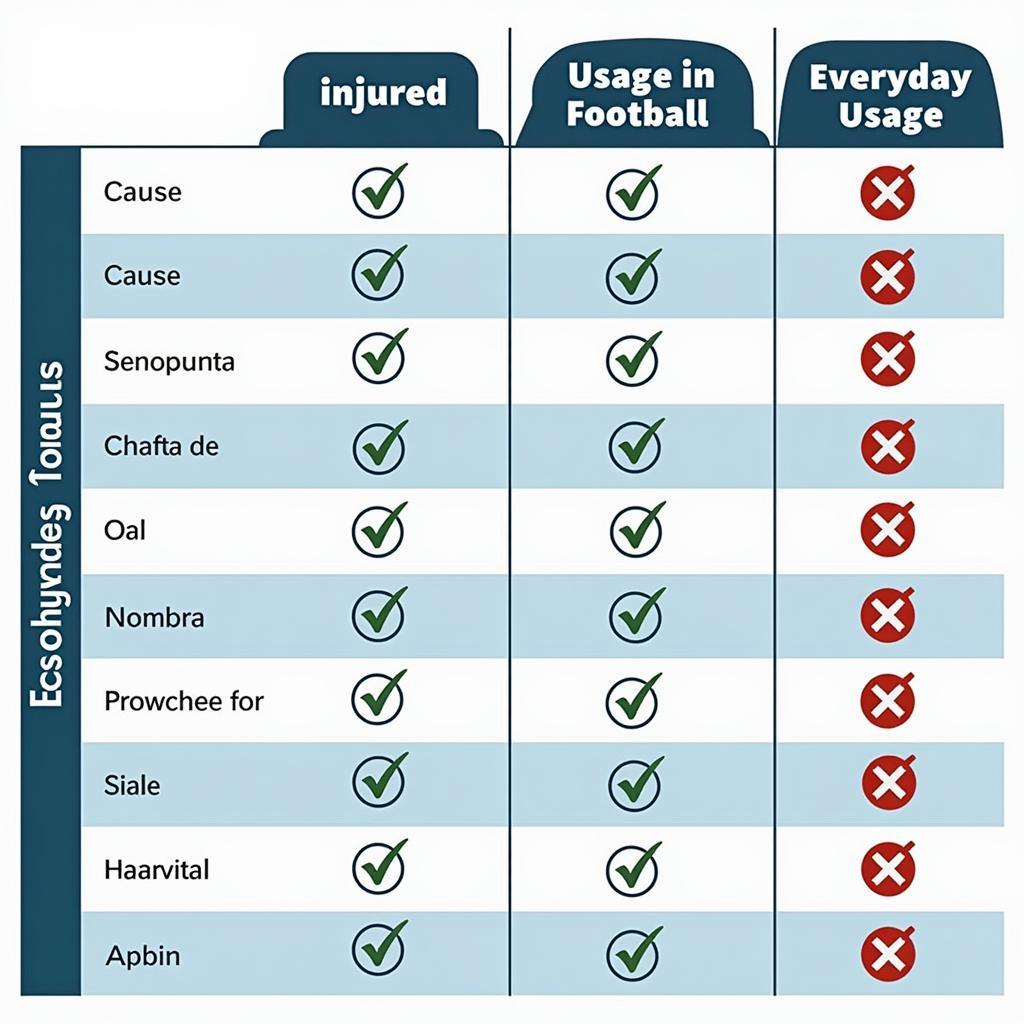Injured Vs Wounded – two words often used interchangeably, yet carrying distinct meanings, especially in the context of football. Understanding the nuances of these terms can be crucial for accurate reporting, analysis, and even casual conversation about the sport. This article delves into the difference between “injured” and “wounded,” exploring their usage in football and beyond.
Decoding “Injured” and “Wounded”
In the realm of sports, particularly football, “injured” is the more common term used to describe any physical harm a player sustains during a game or practice. This harm could range from a minor muscle strain to a more serious fracture or ligament tear. “Injured” encompasses a broad spectrum of physical harm, regardless of the cause. The term implies a temporary setback, with the expectation of recovery and return to play.
“Wounded,” on the other hand, carries a different connotation. While it can also refer to physical harm, it often implies a more serious, often violent, injury inflicted by an external force, such as a tackle that breaks a bone or a collision leading to a concussion. In everyday language, “wounded” is often associated with battle or conflict, emphasizing the severity and external cause of the injury. While a player might be “injured” due to overexertion, they are “wounded” as a result of a specific incident.
 Injured vs Wounded: Football Tackle Scene
Injured vs Wounded: Football Tackle Scene
Injured vs Wounded: Usage in Football
In football commentary, you’ll frequently hear about players being “injured” rather than “wounded.” For example, a commentator might say, “Messi is injured and will be substituted.” This indicates a physical setback, but doesn’t necessarily specify the severity or cause. “Wounded” is less common in this context, reserved for instances of significant, often visible, injury.
When “Wounded” Takes the Field
While less frequent, “wounded” can be used metaphorically in football journalism to describe a team’s performance after a significant defeat or setback. For example, “After the humiliating loss, the team looked wounded, their confidence shattered.” In this sense, “wounded” refers to the emotional and psychological impact, rather than a physical one.
Beyond the Pitch: Everyday Usage
Outside of football, the distinction between “injured” and “wounded” becomes more pronounced. “Injured” remains the broader term, applicable to any physical harm, from a paper cut to a broken arm. “Wounded” specifically refers to injuries caused by external forces, often involving cuts, punctures, or other forms of trauma.
A Matter of Severity
While “wounded” often implies a more serious injury, it’s not always the case. A minor cut can be described as a “wound,” while a severe sprain would be considered an “injury.” The key difference lies in the cause rather than the severity.
Injured vs. Wounded: A Summary
To recap, “injured” is a broad term for any physical harm, while “wounded” specifically refers to injuries caused by an external force, often implying a greater degree of severity. In football, “injured” is the preferred term, with “wounded” reserved for instances of significant or visible trauma, or used metaphorically to describe a team’s emotional state after a setback.
 Injured vs Wounded Comparison Chart
Injured vs Wounded Comparison Chart
Conclusion: Knowing the Difference
Understanding the difference between “injured” and “wounded” allows for clearer communication and a more nuanced understanding of situations involving physical harm, both in football and everyday life. While the terms are often used interchangeably, recognizing their distinct meanings enhances our ability to accurately describe and analyze events. Remembering the context is crucial, as the subtle distinctions between these two words can significantly impact the message conveyed.
FAQ
- Can a player be both injured and wounded at the same time? Yes, a player can suffer an injury (like a pulled muscle) and then receive a wound (like a cut) during the same game.
- Is “wounded” only used for physical injuries? No, “wounded” can also be used metaphorically to describe emotional or psychological harm.
- Why is “injured” more common in football commentary? Because it encompasses a broader range of physical setbacks and avoids specifying the cause or severity.
- Is “wounded” always a more serious injury than “injured”? Not necessarily. The key difference lies in the cause, not the severity.
- How can I use these terms correctly in my own writing? Consider the cause of the harm: if it’s from an external force, “wounded” is likely more appropriate. Otherwise, “injured” is generally the safer choice.
Khi cần hỗ trợ hãy liên hệ Số Điện Thoại: 02838172459, Email: truyenthongbongda@gmail.com Hoặc đến địa chỉ: 596 Đ. Hậu Giang, P.12, Quận 6, Hồ Chí Minh 70000, Việt Nam. Chúng tôi có đội ngũ chăm sóc khách hàng 24/7.